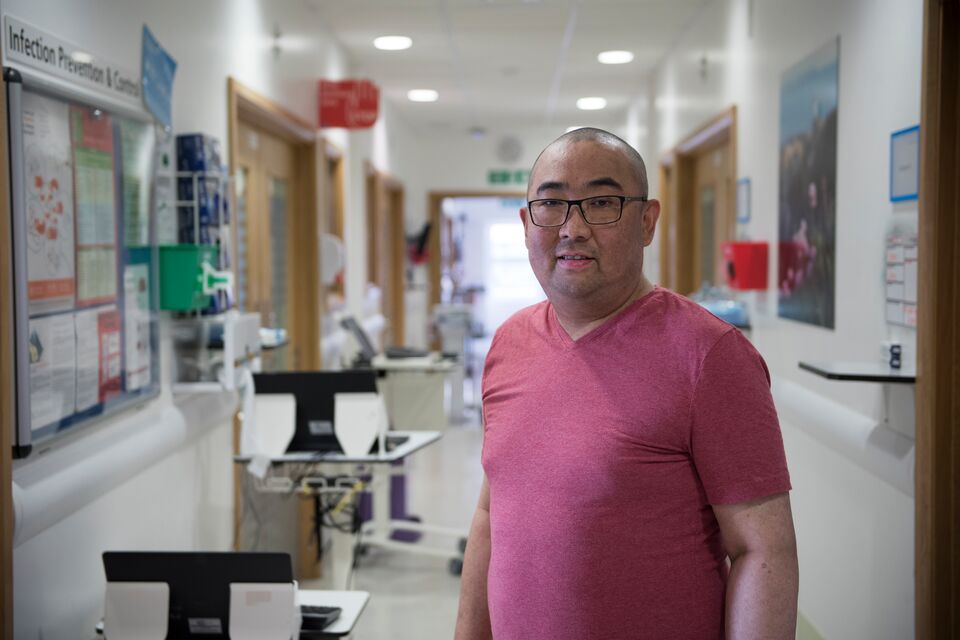
What is patient reported outcomes research?
We know that recovering from a stem cell transplant can be a long and difficult journey for many of our patients. Some of these challenges are a result of the transplant itself, but others arise because improvements need to be made within the healthcare system.
Our patient reported outcomes research aims to give us a better understanding of these challenges and the impact they have on our patients. Based upon our research we develop solutions to meet patient need and campaign for policy change. We also share our research findings with the wider stem cell transplant community to ensure patient-centred evidence is at the heart of clinical and supportive care.
Through patient reported outcomes research we will:
- Enable the routine collection of quality-of-life data across the UK
- Provide real-world evidence of patient quality-of-life and symptom burden
- Generate insight on inequities within the stem cell transplant pathway
- Understand the impact of social determinants of health on transplant outcomes
- Improve patient care and support
How we work
The Anthony Nolan team are experienced in conducting research using qualitative and quantitative methods such as:
- Literature reviews
- Surveys
- Patient reported outcome assessments
- Interviews
- Focus groups
- Co-design and piloting of interventions
Patient and public involvement is central to the patient-reported outcomes research conducted at Anthony Nolan. Patient advisory groups shape the research questions we ask and provide input on the methods we use. Each patient advisory group is made up of up to six individuals with either lived experience of receiving a stem cell transplant or experience of caring for someone who has received a stem cell transplant. We consider all aspects of stem cell transplantation from the management of early side effects to establishing late effects clinics, vaccinations and palliative care.
We also work closely with clinicians and allied health professionals to better understand their perceptions of the healthcare they provide, the challenges they face and how we can make, or advocate for, improvements to transplant services.
Group leader profile
Dr Gemma Pugh
Head of patient reported outcomes research
Gemma is the head of patient reported outcomes research at Anthony Nolan within the Patient Services team. She has a PhD in Behavioural Science and a specific research interest in cancer survivorship. She has led various studies to investigate survival outcomes and health behaviour change among children and young people affected by cancer.
Her research includes using quantitative and qualitative methods to understand patient, caregiver and professionals’ experiences and expectations of health care. Prior to joining Anthony Nolan, she worked in Aotearoa, New Zealand managing the New Zealand Children’s Cancer Registry (NZCCR) where she led analysis investigating differences in cancer incidence and survival outcomes between ethnic groups.
Gemma is also a trustee for Trekstock. Trekstock is a UK charity that supports young adults in their 20s and 30s living with cancer. As a trustee, she brings her expertise in health outcomes and patient engagement to help shape the charity’s strategic direction and amplify the voices of young people navigating cancer.

Team members
- Dr Christina Yiallouridou
- Dr Lauren Young
- Tomos Llyod-Roberts
- Karen Dean
Get involved in our work
If you are a healthcare professional in the field of haematology and transplant care, and you’re interested in being involved in our research, please do get in touch to discuss how we can work together.
If you are a patient and would like to be involved in our research, please join the Patients & Families Network. We share all our opportunities to join a study on the Network.
Examples of current projects
SEQoL – Scaled collection of socioeconomic and quality of life data among patients undergoing allogeneic haematopoietic cell transplantation
+
-
The SEQoL study was developed with input from patients and healthcare professionals and was preceded by a successful feasibility pilot study. The purpose of the SEQoL study is to scale the collection of socioeconomic and quality-of-life data among stem cell transplant recipients. So far, we’ve launched SEQoL in 15 transplant centres over the first year, and have recruited over 200 patients. We plan to continue expanding this initiative over the next year.
Within the SEQoL study, adult (>18 years) stem cell transplant patients are invited to complete a brief demographic and quality-of-life questionnaire before undergoing conditioning, on the day of transplant (day 0), on days 28, 100, 180, 270 and 365 post-transplant. Outcome measures include the MacArthur Ladder, The Functional Assessment of Cancer Therapy – Bone Marrow Transplantation (FACT-BMT), and Lee Symptom Scale. Transplant centres are responsible for patient recruitment and consent, whereas outcome data collection and follow-up are managed by the research team at Anthony Nolan. Each transplant centre receives a tablet computer to facilitate e-consent and electronic data collection at baseline. Patient consent is obtained at enrolment to link patient reported outcome data from the SEQoL study with clinical outcome data held by national registries. SEQoL data will be linked to clinical outcome data held by the BSBMTCT. The SEQoL study will enable investigation into the temporal change in quality-of-life outcomes post-transplant and the effect of subjective and objective socioeconomic status on patient outcomes, including survival. Read more about the study here.
SEQoL associate principal investigator scheme
+
-
The NIHR Associate Principal Investigator Scheme is a six month in-work training opportunity, providing practical experience for health and care professionals starting their research career. People who would not normally have the opportunity to take part in clinical research in their day-to-day role have the chance to experience what it means to work on and deliver an NIHR portfolio trial under the mentorship of a Local Principal Investigator (PI).
The SEQoL study is part of the NIHR Associate PI scheme. Our Patient Services research team is here to support you through the process. If you’d like to get involved, get in touch and we will support you through the set-up process.
Understanding patients views towards quality-of-life and socioeconomic data collection
+
-
The research team have worked with Patient Advisory Group members to co-design a qualitative interview study to explore patient views about how socioeconomic and quality-of-life data should be collected in the transplant setting. These studies provided valuable insight on how and when this type of data should be collected, and whether existing patient reported outcome measures accurately reflect the patient experience of wellbeing after a stem cell transplant.
Read more about this work and the publications of the findings.
Meet the researchers
Dr Christina Yiallouridou
Research manager
Christina is the research manager in Patient Services at Anthony Nolan, having joined the organisation in 2022 as a research officer. In her current role, Christina focuses on research into socioeconomic factors and quality-of-life outcomes, contributing to key projects such as PrEQoL and SEQoL, and collaborating with the team to support and deliver studies that aim to improve patient experiences.
She completed a PhD in Vision Sciences at Cardiff University in 2023. Her research, "Investigation of pain and discomfort associated with intravitreal anti-VEGF injections: a mixed-methods study", explored patient experiences of macular degeneration treatment through interviews, validated questionnaire measures of pain, anxiety and mental wellbeing, and physiological assessments. Working closely with both patients and healthcare professionals, the study also examined predictors of pain during intravitreal procedures using electrodermal activity as a measure of physiological arousal. Christina holds an MSc in Neuroimaging: Methods and Applications from Cardiff University, completed in 2018, and a BSc in Pharmacology from University College London (UCL), awarded in 2016.
Meet the researchers
Dr Lauren Young
Research officer
Lauren joined our research team in 2023. Lauren originally studied History but was introduced to the world of the Social History of Medicine. Her Master’s focused on the history of Diabetes in nineteenth-century Ireland, using medical journals and materials from the time to map the advancement of treatment, as well as patient access to these advancements. Lauren then went on to do a PhD in history & lived experience of patients with diabetes, specifically type one diabetes.
When the job of research officer in patient-reported outcomes research came up, Lauren knew it was the one for her! She is extremely passionate about patient-focused research and exploring the patient experience. The patient voice is an essential part of our work, and Lauren feels privileged to be collecting that through our qualitative research and seeing firsthand the impact our work has on patients.
Meet the researchers
Tomos Lloyd-Roberts
Research officer
Tomos joined Anthony Nolan in early 2024. Tomos started his career by studying a BSc in Psychology and a MSc in Clinical Neuropsychology. He worked as an assistant Psychologist for four years contributing to research projects.
Tomos helped investigate dialectical behaviour therapy as a support tool for children with psychological needs and led a thematic analysis looking at service provision in pupil referral units. While working in the NHS, he led a service evaluation of seclusion and restraint practices in forensic settings, as well as a scoping review of non-pharmaceutical interventions for Mild Cognitive Impairment. This work helped inform the design of a new lifestyle-based intervention for the same group.
Tomos then moved into full time research and co-ordinated a randomised controlled trial focusing on symptom management in Parkinson’s disease.
Meet the researchers
Karen Dean
Clinical co-ordinator
Karen joined Patient Services in 2021 as the clinical support officer working with Rachel Miller, Anthony Nolan lead nurse and head of patient services on the funded and adopted roles, and Dr Gemma Pugh, head of patient reported outcome research on the various studies we have been creating. Karen started out as a nurse in A&E where her passion for helping vulnerable people was ignited. She then also worked for AXA PPP Healthcare for six years as a clinical specialist studying complex operation notes and negotiating with specialists on their fees. She also researched specialists on behalf of clinical negligence to support the teams work in creating safe environments for patients to navigate their procedure journeys. In her final year there she advocated for patients alongside a firm of lawyers regarding clinical negligence.
After a sabbatical from this line of work, the COVID-19 epidemic made her realise that she is happiest when helping and caring for people and was delighted to start at Anthony Nolan.
